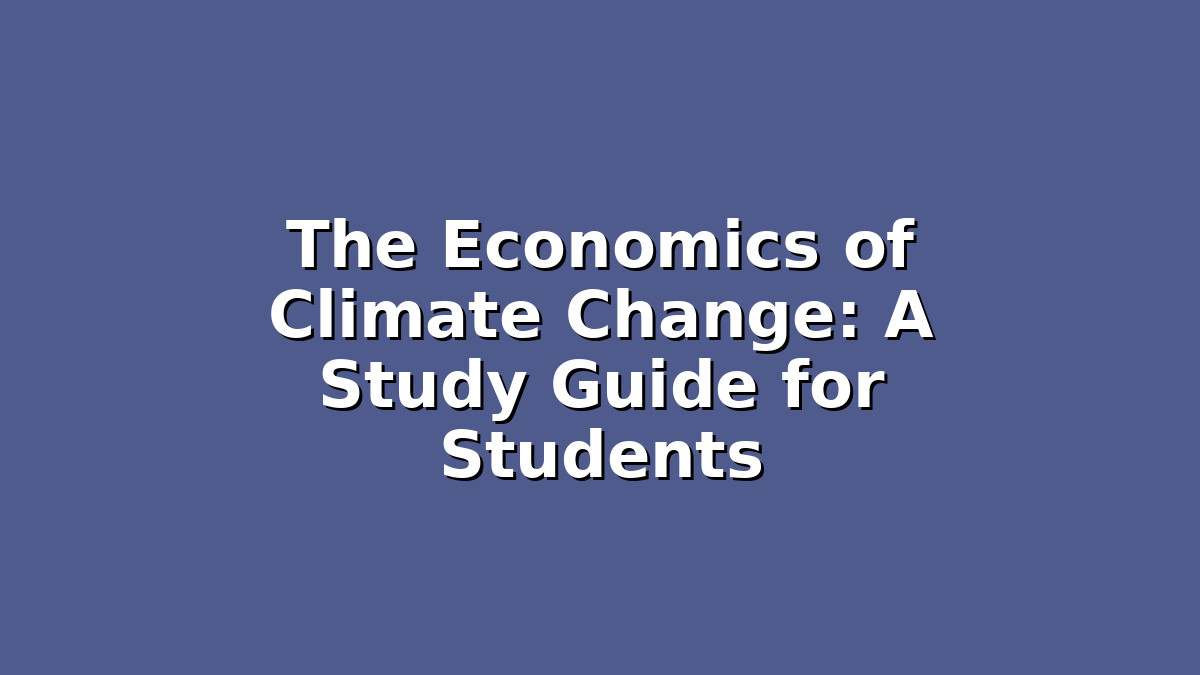Climate change is one of the most urgent issues facing the world today, and understanding its economic impact is essential for students preparing for exams or seeking to deepen their knowledge. The economics of climate change explores how environmental changes influence economies and how economic policies can help mitigate or adapt to these changes. This topic frequently appears in subjects like economics, environmental science, geography, and social studies, making it critical for exam success. In this article, we’ll break down the key concepts of climate change economics and offer practical study tips to help you master this complex but fascinating subject.
Understanding the Basics: What Is the Economics of Climate Change?
Before diving into detailed concepts, it’s important to understand what the economics of climate change entails. Essentially, this field examines the costs and benefits related to both the causes and consequences of climate change. Economists analyze how climate change affects resources, production, and consumption, as well as how policies like carbon taxes or emissions trading systems can influence economic behavior.
For students, grasping the basics means focusing on these core ideas:
– Externalities: Climate change is a classic example of a negative externality, where the social cost of carbon emissions is higher than the private cost faced by businesses or individuals.
– Cost-benefit analysis: Economists use this tool to weigh the costs of taking action against the benefits of reducing climate impact.
– Market failures: Because climate change causes market failures, government intervention is often necessary.
#### Study Tip #1: Create Concept Maps
Drawing concept maps linking terms like “externalities,” “carbon pricing,” and “adaptation” can help you visualize how different ideas connect. This technique aids memory retention and makes revision more interactive.
Section 1: The Economic Impacts of Climate Change
Climate change impacts economies worldwide in diverse ways. Rising temperatures, extreme weather events, and shifting agricultural patterns affect productivity, health, and infrastructure. For students, it’s important to understand both direct and indirect economic effects.
– Agricultural output: Changes in rainfall and temperature affect crop yields, which can lead to food shortages and price volatility.
– Health costs: Increased heat waves and the spread of diseases raise healthcare expenses and reduce labor productivity.
– Damage to infrastructure: Floods, storms, and sea-level rise cause costly damage to roads, buildings, and energy systems.
– Loss of biodiversity: Economic activities dependent on ecosystems, like fishing and tourism, suffer when biodiversity declines.
Economists often use models to forecast these impacts. For example, the Stern Review estimates that delaying action on climate change could cost the global economy up to 20% of GDP by 2100, while early intervention might only cost around 1% of GDP.
#### Study Tip #2: Use Real-World Examples
Linking theoretical knowledge to current events makes the topic more relatable and easier to remember. For example, research how recent hurricanes have affected economies and include this in your notes or essays. This not only enriches your answers but also demonstrates a practical understanding of the material.
Section 2: Economic Policies to Combat Climate Change
Governments and organizations use various economic policies to reduce greenhouse gas emissions and promote sustainability. Understanding these tools is crucial for exam success.
– Carbon Pricing: This includes carbon taxes and cap-and-trade systems that put a price on carbon emissions, incentivizing companies to reduce pollution.
– Subsidies for clean energy: Financial support for renewable energy projects helps shift the economy away from fossil fuels.
– Regulations and standards: Governments may impose limits on emissions or require energy efficiency, influencing economic decisions.
– Investment in green technology: Funding research and development spurs innovation that can reduce costs and emissions in the long run.
These policies reflect the economic principle of internalizing external costs — by making polluters pay, the overall efficiency of the market improves.
#### Study Tip #3: Practice Past Exam Questions
Past papers often ask about economic policies related to climate change. Practice answering questions that require you to evaluate the effectiveness of different policies. Writing clear, concise answers that include definitions, examples, and evaluation will boost your confidence and exam performance.
Section 3: Balancing Economic Growth and Environmental Sustainability
One of the biggest challenges in the economics of climate change is balancing economic growth with environmental protection. Students should explore the concept of sustainable development, which aims to meet present needs without compromising future generations.
– Green growth: This concept advocates for economic expansion that is environmentally sustainable, often through innovation and efficient resource use.
– Decoupling: The goal is to reduce the environmental impact per unit of economic output, meaning economies can grow without increasing emissions.
– International cooperation: Climate change is a global problem requiring collective action, as seen in agreements like the Paris Accord.
– Equity and fairness: Different countries and populations contribute differently to climate change and face varying impacts, raising important ethical and economic questions.
Understanding trade-offs and the complexity of sustainable development is essential for essays and discussions.
#### Study Tip #4: Form Study Groups
Discussing these intricate issues with peers can deepen your understanding. Study groups allow you to hear different perspectives and clarify confusing concepts. Try debating the pros and cons of economic growth vs. environmental sustainability to prepare for essay questions and interviews.
Conclusion
The economics of climate change is a vital subject for students preparing for exams or seeking to understand one of the most pressing global challenges. By mastering key concepts like externalities, economic impacts, policy tools, and sustainable development, you will be well-equipped to tackle exam questions with confidence. Remember to use concept maps, real-world examples, past exam papers, and study groups to reinforce your learning. Keep a positive mindset—this topic is complex, but with consistent effort and strategic studying, you can excel and contribute to this important field.
Good luck with your studies!

Responses